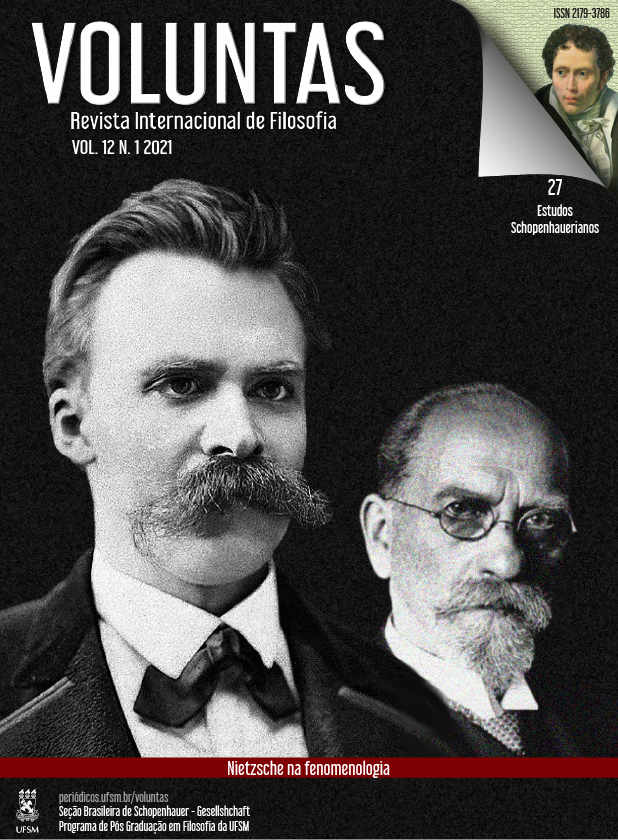From Nietzsche to Husserl. A phenomenological consideration of fantasy in light of the world’s tragic intuition
DOI:
https://doi.org/10.5902/2179378664503Keywords:
Fantasy, Presentation, Antiquity, World intuition, Appearance, Life-worldAbstract
In this paper I’m going to develop a phenomenological reading of The Birth of Tragedy of Nietzsche. I will specify some considerations around the conception of Phantasie in Husserl’s phenomenology. In this way, I will propose an interpretation of Phantasie in the light of Nietzsche’s philological considerations, in order to understand the idea of Antiquity in the light of metaphysics-aesthetics perspective synthesized in his world’s tragic intuition. How does the interpretation of Greek Antiquity offer clues to a phenomenology of fantasy? This will be the central issue to be discussed, with the intention to clarify the way of presentation of the phenomenon of tragic art, in so far as expression of life-world of the Greeks.Downloads
References
ARISTÓTELES Poética. Trad. Alicia Villar. Madrid: Alianza Editorial, 2011.
BABICH, B. Nietzsche’s Performative Phenomenology: Philology and Music. En: Boublil, É.; Daigle, Ch. (Eds.) Nietzsche and Phenomenology. Power, Life, Subjectivity: “Part II. Power and Expression”. Bloomington: Indiana University Press, 2013.
BARRIGA, F. El mundo como fenómeno estético: la metafísica de artista de Nietzsche en cuanto innovadora ontología de mundo. Tesis de grado de Magíster. Santiago de Chile: Universidad Alberto Hurtado, 2020.
BOEHM, R. Husserl and Nietzsche. En: Boublil, É.; Daigle, Ch. (Eds.) Nietzsche and Phenomenology. Power, Life, Subjectivity: “Part I. Life and Intentionality”. Bloomington: Indiana University Press, 2013.
COLLI, G. Primera parte. ; Segunda parte. Escritos y apuntes preparatorios (1938 – 1940) (§§1 – 3). En: Colli, G. Apolíneo y dionisíaco [título original: Apollineo e dionisiaco]. Trad. Miguel Morey. Editorial Sexto Piso: Madrid, 2020.
COLLI, G. El nacimiento de la filosofía. Trad. Carlos Manzano. Buenos Aires: Tusquets Editores, 2010.
COLLI, G. VI. Heráclito; VII. Empédocles. En: Colli, G. La naturaleza ama esconderse [título original: Physis kryptesthai philei]. Trad. Miguel Morey. Madrid: Ediciones Siruela, 2008.
HEIDEGGER, M. Libro I. La voluntad de poder como arte (1936 – 1937): Nietzsche como pensador metafísico. In HEIDEGGER, M (Editorial Ariel). Heidegger, M. Nietzsche Trad. Juan Luis Vermal. Barcelona: Editorial Ariel, 2014. Pp. 17 – 20
HEIDEGGER, M. Las cinco proposiciones del arte. In HEIDEGGER, M (Editorial Ariel). Heidegger, M. Nietzsche. Trad. Juan Luis Vermal. Barcelona: Editorial Ariel, 2014. Pp. 72 – 80
HEIDEGGER, M. La embriaguez como estado estético. In HEIDEGGER, M (Editorial Ariel). Heidegger, M. Nietzsche. Trad. Juan Luis Vermal. Barcelona: Editorial Ariel, 2014. Pp. 93 – 106
HEIDEGGER, M. La provocativa discrepancia entre verdad y arte. In HEIDEGGER, M (Editorial Ariel). Heidegger, M. Nietzsche. Trad. Juan Luis Vermal. Barcelona: Editorial Ariel, 2014. Pp. 138 - 146
HUSSERL, E. Translator’s Introduction; Chapter 1. The Question of Phantasy Presentation in Contrast to Perceptual Presentation. En: Husserl, E. Phantasy, Image Consciousness, and Memory (1898 – 1925), Vol. 11 [título original: Phantasie, Bildbewußtsein, Erinnerung, Band 23]. Trad. John B. Brough. Washington, D.C: Springer, 2005.
HUSSERL, E. Sección Primera. Las intenciones y los cumplimientos objetivantes. El conocimiento como síntesis del cumplimiento y sus grados: Cap. 1—Intención significativa y cumplimiento significativo, pp. 605 – 629; Cap. 2—Caracterización indirecta de las intenciones objetivantes y de sus variedades esenciales por las diferencias en las síntesis de cumplimiento, pp. 633 – 640; Cap. 3—Para la fenomenología de los grados del conocimiento, pp. 645 – 669. En: Husserl, E. Investigaciones Lógicas 2 [título original: Logische Untersuchungen]. Versión de Manuel G. Morente; José Gaos. Madrid: Alianza Editorial, 1999.
MONTINARI, M. La época de Basilea (1869 – 1879)Trad. Fernando Barriga. In: Nietzsche. Eine Einführung Walter De Gruyter Verlag: Berlin, 1998. Pp. 57 – 59.
NIETZSCHE, F.; COLLI, G.; MONTINARI, M. (Eds.) Kritische Gesamtausgabe Werke und Briefe. Paolo D’Iorio (2009) (Ed. digital). Berlin/New York: Walter De Gruyter Verlag, 1967.
NIETZSCHE, F.; COLLI, G.; MONTINARI, M. (Eds.) Vorlesungsaufzeichnungen (SS 1870 – SS 1871): “Zur Geschichte der griechischen Tragödie: Einleitung in die Tragödie des Sophocles. 20 Vorlesungen [SS 1870]: Einleitung, pp. 7 – 10; §1. Die antike und die neuere Tagödie in Ansehung des Ursprungs, pp. 10 – 14; §2. Die Musik in der Tragödie. (der Dithyrambus), pp. 14 – 17”. En: Nietzsche, F.; Colli, G.; Montinari, M. NIETZSCHE WERKE. Kritische Gesamtausgabe. Berlin/ New York: Walter de Gruyter Verlag, 1993.
NIETZSCHE, F. Homer un die klassische Philologie. Versión Kindle. Deutschland: Die Perfekte Bibliothek, 2015.
NIETZSCHE, F. El nacimiento de la tragedia [título original: Die Geburt der Tragödie aus dem Geiste der Musik]. Trad. Andrés Sánchez Pascual. Madrid: Alianza Editorial, 2012.
NIETZSCHE, F. Fragmentos póstumos. Una selección. Ed. Günther Wohlfart; Trad. Joaquín Chamorro. Madrid: Abada Editores, 2004.
WINCKELMANN, J. J. Reflexiones sobre la imitación de las obras griegas en la pintura y la escultura. Trad. Salvador Mas. México: FCE, 2008.
Published
Versions
- 2022-04-12 (2)
- 2021-04-26 (1)
How to Cite
Issue
Section
License
Copyright (c) 2021 Voluntas: International Journal of Philosophy

This work is licensed under a Creative Commons Attribution-NonCommercial-ShareAlike 4.0 International License.
The submission of original manuscripts to this journal implies the transference, by the authors, of the copyrights for printed and digital publication. The copyrights of a published manuscript belong ultimately to the author, and only the copyright for its first publication is reserved to the journal. Authors may only use the same results in other publications explicitly indicating this journal as the medium of the original publication.
Licence
Attribution-NonCommercial-ShareAlike 4.0 International (CC BY-NC-SA 4.0) - This license lets others remix, tweak, and build upon your work non-commercially, as long as they credit you and license their new creations under the identical terms.






